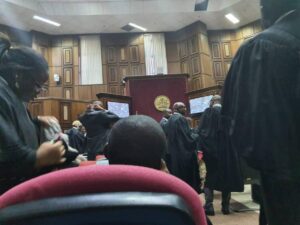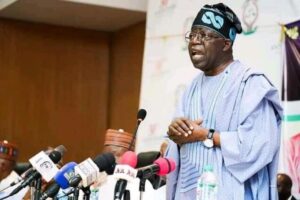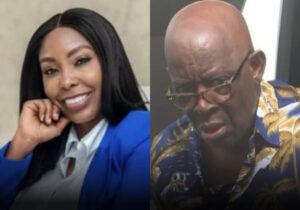Media and privacy rights advocates have offered sharp criticism against President Muhammadu Buhari’s rejection of the Digital Rights and Freedom Bill, warning the action could portray Nigeria as a country lacking in crucial regulatory framework to protect citizens’ rights on the Internet.
Mr Buhari in a veto message to the National Assembly on Wednesday said the bill covered “too many technical subjects” yet failed “to address any of them extensively.”
The president said the bill could also prove problematic for current and future legislation around Internet freedom, which he acknowledged had a broadening debate around it.
Mr Buhari consequently suggested that “the scope of the bill should be limited to the protection of human right within the digital environment to reduce the challenge of duplication and legislative conflict in the future.”
Lawmakers did not immediately say chart a new course of action around the bill, but proponents have vowed to push on until it becomes a federal law.
Media and privacy rights experts who played critical roles in drafting and championing of the disputed legislation contended that it essentially would have engendered better protection of citizens’ rights amidst an expanding modern communication.
The International Press Centre (IPC) in Lagos disagreed with Mr Buhari’s grounds in a statement to PREMIUM TIMES, saying the bill “clearly provides for the protection of human rights online.”
Lanre Arogundade, IPC’s director, said the bill will “protect Internet users from infringement of their fundamental freedoms and guarantee the application of human rights for digital platform users.”
“The bill also seeks to guarantee human rights within the context of emerging innovative technologies, security concerns, increasing citizen participation in governance and democratic processes,” Mr Arogundade said.
The IPC said Mr Buhari should sign the bill “as it is,” because it holds the potential to “revolutionise the state of digital rights in the country for the better and in a manner comparable to international standards.”
<img data-attachment-id="248122" data-orig-file="https://media.premiumtimesng.com/wp-content/files/2017/11/Lanre-Arogundade-e1509634099205.jpg" data-orig-size="900,506" data-comments-opened="1" data-image-meta="{"aperture":"0","credit":"","camera":"","caption":"","created_timestamp":"0","copyright":"","focal_length":"0","iso":"0","shutter_speed":"0","title":"","orientation":"0"}" data-image-title="Lanre-Arogundade" data-image-description="
The Director of the IPC, Lanre Arogundade. [Photo credit: Guardian Nigeria]
” data-medium-file=”https://i2.wp.com/media.premiumtimesng.com/wp-content/files/2017/11/Lanre-Arogundade-e1509634099205.jpg?fit=526%2C296&ssl=1″ data-large-file=”https://i2.wp.com/media.premiumtimesng.com/wp-content/files/2017/11/Lanre-Arogundade-e1509634099205.jpg?fit=604%2C340&ssl=1″ src=”https://onlinenigeria.com/wp-content/uploads/2019/03/media-rights-experts-fault-buharis-rejection-of-digital-rights-bill.jpg” width=”600″ height=”337″ data-original-width=”600″ data-original-height=”337″ itemprop=”http://schema.org/image” title=”Lanre-Arogundade” alt=”Lanre-Arogundade” data-pagespeed-url-hash=”893761933″>
The Institute for Media and Society, IMS, urges President Muhammadu Buhari to reconsider his stance on the Digital Rights and Freedom Bill brought for his assent after its passage by the National Assembly.
Concerns around Nigerians’ rights on the Internet have mounted in recent years, amidst rising cases of a government crackdown on citizens’ free speech and intrusion into Internet communication.
Dozens of Nigerians, including journalists, bloggers and social commentators, have been arrested and their communication controversially intercepted since the adoption of the Cybercrime Act in 2015, which coincided with Mr Buhari’s assumption of office. Rights advocates regularly hold the government accountable for the infractions, which they see as a credible justification to push for a balanced legal mechanism that would ensure both citizens’ rights and national security are protected — but not at the expense of one another.
“We are surprised that the president declined assent to this bill, a comprehensive and timely document which conforms to global trends and standards,” said the Institute for Media and Society (IMS) in a statement. “It is one document which preparation enjoyed the inputs of a wide diversity of stakeholders.”
Akin Akingbulu, IMS’ executive director, said the organisation found Mr Buhari’s reasons difficult to come to terms with.
“It is difficult to agree with the argument that a bill cannot receive presidential signature because it contains subjects addressed in other bills whose journeys in the legislative processing mill are uncertain,” the statement said.
“The refusal of assent by Mr President will send negative signals to the international community on the government’s attitude to freedom of expression and human rights in general as well as its approach to policy-making on issues which are central to building a democracy.
“We call on the National Assembly and other stakeholders to remain in support of this bill and engage further with the Presidency so that the bill will return to become law in the near future,” the IMS said.
You may be interested

PSG To Reignite Interest In Osimhen
Webby - December 21, 2024Paris Saint-Germain have contacted Napoli to discuss signing Victor Osimhen in January, according to reports in France.It is reported that…

Arteta Provides Injury Updates On Five Arsenal Players Ahead Palace Clash
Webby - December 20, 2024Arsenal manager Mikel Arteta has revealed that Declan Rice and Riccardo Calafiori are both available to be in the Gunners…

Carabao Cup: Spurs Edge Man United In Seven-Goal Thriller To Reach Semi-finals
Webby - December 19, 2024Tottenham Hotspur edged Manchester United 4-3 in the quarter-finals of the Carabao Cup on Thursday.Spurs raced to a 3-0 lead…





















![American Pastor, David Wilson Seen Eating The Box Of Woman Who Isn’t His Wife [Video]](https://onlinenigeria.com/wp-content/uploads/2019/10/american-pastor-david-wilson-seen-eating-the-box-of-woman-who-isnt-his-wife-video-150x150.jpg)









